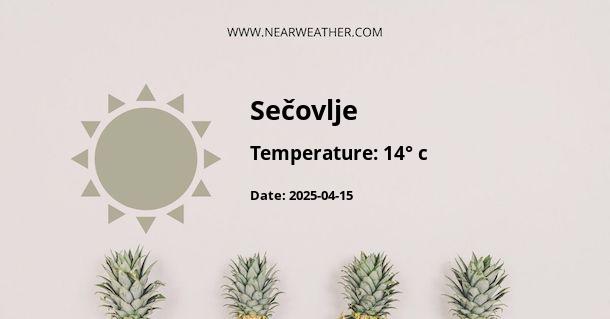Understanding the Climatic Intricacies of Sečovlje, Slovenia
In the embrace of the Adriatic Sea lies Sečovlje, a small settlement that's part of the Municipality of Piran in the picturesque region of Slovenian Istria. The climate in Sečovlje is characterized by its Mediterranean influence, which graces the area with warm summers and mild winters. This unique microclimate is a focal point for tourists and scientists alike, as it supports a rich biodiversity, including the famous Sečovlje Salina Nature Park.
Seasonal Climate Overview of Sečovlje
The following sections provide a detailed month-by-month breakdown of the weather patterns typically experienced in Sečovlje, situated on the Slovenian coast:
Winter: December to February
The winter in Sečovlje is generally mild, with average daytime temperatures hovering around 10°C (50°F). However, the region can experience occasional cold spells influenced by the northeastern winds, known locally as the 'bora,' which can cause temperatures to drop significantly. Precipitation is moderate during this season, and snowfall is rare but not unheard of.
The winter months see an average precipitation of 80mm (3.1 inches) per month, allowing for a relatively dry season compared to inland areas of Slovenia.
Spring: March to May
Spring brings a resurgence of life in Sečovlje with a steady increase in temperature and day length. The average temperature ranges from 15°C to 20°C (59°F to 68°F). Precipitation begins to decrease, leading to a splendid display of flora, particularly well observed within the Sečovlje Salina Nature Park.
- March: Increasing temperatures and sporadic rainfall mark the transition from winter to spring.
- April: Warmer weather stabilizes with more consistent sunshine.
- May: You can feel the approach of summer with occasional hot days and balmy evenings.
By May, rainfall quantities diminish to approximately 70mm (2.8 inches), setting the stage for the dry season.
Summer: June to August
Summertime in Sečovlje boasts warm and dry conditions. Thermometers regularly register temperatures in the range of 25°C to 30°C (77°F to 86°F). The sirocco, a warm wind from the Sahara, occasionally sweeps through, elevating temperatures and humidity.
The Sečovlje Salina Nature Park thrives during summer, with its salt pans naturally producing salt through the evaporation process facilitated by the high temperatures and steady breezes.
Autumn: September to November
The post-summer period in Sečovlje gradually shifts from the warmth of summer to cooler and rainier conditions. September clings to the summer's warmth, while October brings an increase in rainfall and the arrival of cooler weather. By November, the average temperature often falls below 15°C (59°F), with increasing precipitation signaling the approach of winter.
Autumn is a critical period for the local ecosystem, as the first rains after summer replenish water sources and prepare the environment for the cooler months ahead.
Annual Climate Data and Patterns
The climate data for Sečovlje displays a typical Mediterranean trend, with hot, dry summers and mild, damp winters. The following are key climatic figures that highlight the seasonal cycles of this charming Slovenian locality:
| Month | Average High (°C) | Average Low (°C) | Average Precipitation (mm) |
|---|---|---|---|
| January | 8 | 4 | 75 |
| February | 9 | 4 | 64 |
| March | 13 | 7 | 75 |
| April | 17 | 11 | 77 |
| May | 22 | 15 | 68 |
| June | 26 | 19 | 60 |
| July | 29 | 21 | 43 |
| August | 29 | 21 | 63 |
| September | 24 | 17 | 93 |
| October | 19 | 13 | 107 |
| November | 13 | 9 | 111 |
| December | 9 | 5 | 92 |
This climate data offers an essential guide for visitors and locals planning activities and understanding the unique weather dynamics of Sečovlje. From a viticultural perspective, this microclimate provides excellent conditions for olive groves and vineyards, which are a significant part of the local economy and cultural heritage.
Impact of Climate Change on Sečovlje's Weather Patterns
As a coastal location sensitive to sea level changes and extremes in weather, Sečovlje is not immune to the effects of climate change. According to expert opinions and research findings, there has been a noticeable trend of increasing temperatures and altered precipitation patterns. These changes have implications for local agriculture, biodiversity, and the sustainability of traditional salt-making practices.
Research suggests that the Mediterranean region, including coastal Slovenia, will face hotter and drier summers, with a subsequent increase in the frequency and intensity of extreme weather events.
Efforts are underway to monitor and mitigate the influence of climate change on this fragile ecosystem. The Sečovlje Salina Nature Park, in particular, serves as a critical conservation area for endemic species and as a barometer for the health of the region's climate.
Conclusion
The climate and weather patterns in Sečovlje present a compelling blend of Mediterranean charm and ecological significance. Understanding these patterns is crucial not only for the enjoyment and planning purposes of visitors but also for the preservation of the area's natural and cultural assets. As Sečovlje continues to adapt to the evolving climate landscape, it is essential to support sustainable practices that will ensure the legacy of this unique corner of Slovenia for generations to come.
A - Sečovlje's Latitude is 45.476669 & Longitude is 13.623330.
A - Weather in Sečovlje is 14° today.
A - Climate Conditions in Sečovlje shows heavy intensity rain today.
A - Humidity in Sečovlje is 88% today.
A - Wind speed in Sečovlje is 12.96 km/h, flowing at 130° wind direction. today.
